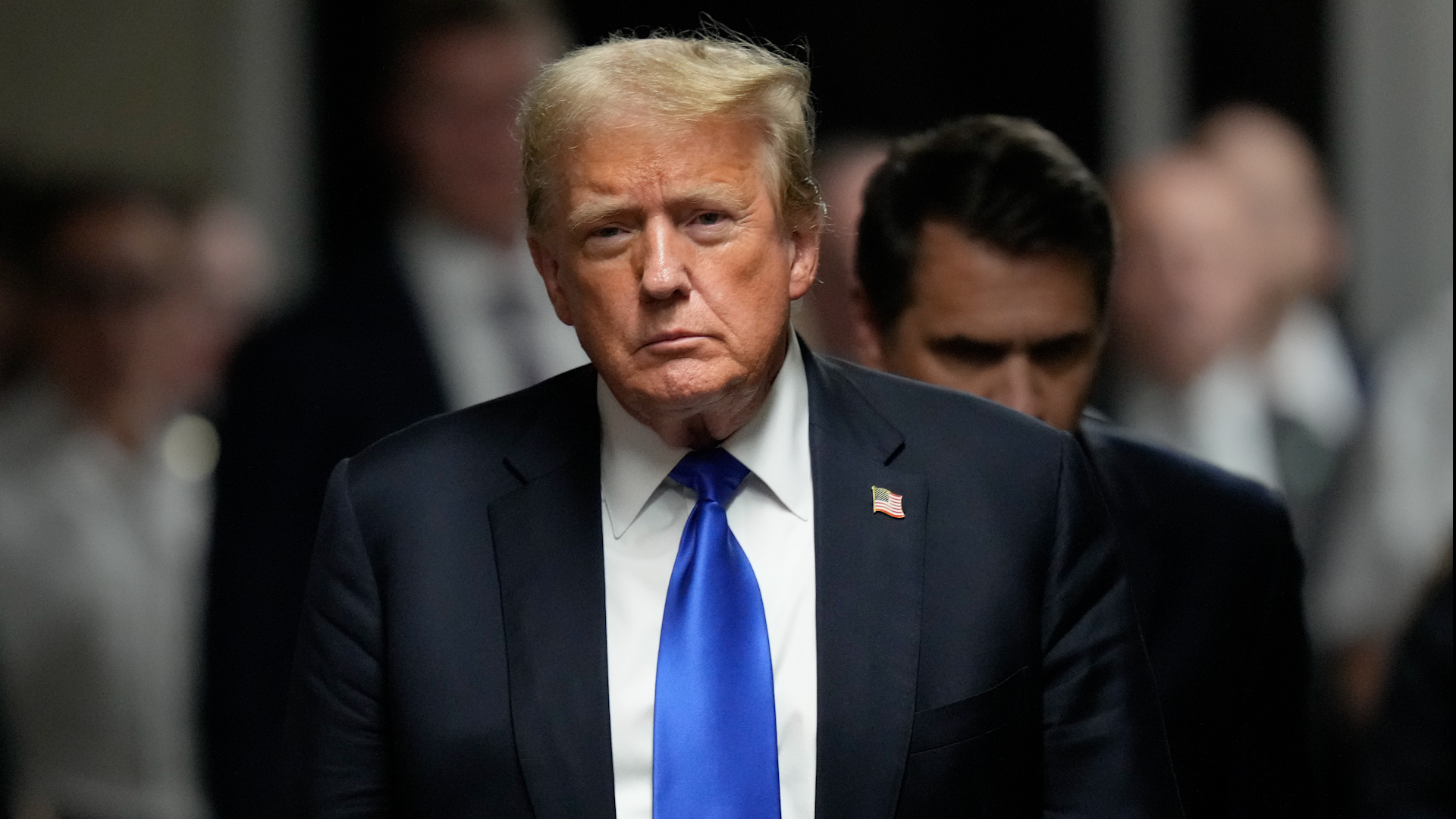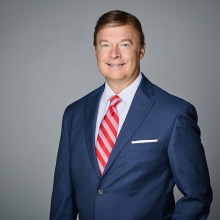
Trump asks Supreme Court to block sentencing in NY hush money case
By Craig Nigrelli (Anchor), William Jackson (Producer), Kaleb Gillespie (Video Editor)
President-elect Donald Trump petitioned the U.S. Supreme Court (SCOTUS) to delay his sentencing in the New York hush-money case. He argued that proceeding Friday, Jan. 10 could disrupt national security and hinder the presidential transition.
Media Landscape
See how news outlets across the political spectrum are covering this story. Learn moreBias Distribution
Left
Untracked Bias
Trump’s legal team contended that sentencing a president-elect poses significant risks to the federal government and national security. They argued presidential immunity should shield Trump and warned that moving forward creates what they call “a constitutionally intolerable risk.”

Download the SAN app today to stay up-to-date with Unbiased. Straight Facts™.
Point phone camera here
The legal team’s request references a 2024 SCOTUS ruling that expanded presidential protections. It granted former presidents broad immunity for actions deemed part of their official duties.
SCOTUS asked New York prosecutors to respond to the petition by Thursday morning, leaving a narrow window before the Friday deadline.
If the justices grant a stay, Trump’s sentencing could be delayed indefinitely, given the limited time before his January inauguration.
Once inaugurated, legal precedent suggests he may regain immunity from criminal prosecution.
Trump’s hush money case
The case stems from hush money payments made to adult film actress Stormy Daniels during his 2016 campaign.
A grand jury convicted Trump in May 2024 on 34 felony counts of falsifying business records related to hush money payments intended to influence the outcome of the 2016 election.
Legal experts noted that such payments may violate campaign finance laws, as they could be viewed as unreported election expenditures.
The trial judge, however, indicated plans to issue an unconditional discharge, a sentence that avoids jail time, fines or probation. The judge cited the importance of preserving the presidential transition process and respecting the principles of presidential immunity.
Despite the absence of penalties, Trump’s legal team argued that a felony conviction carries significant consequences. These consequences include harm to his reputation and potential future restrictions.
Trump’s lawyers also claimed the case relies on evidence of his time in office, such as social media posts and testimony from former advisers. They argued that they should be immune under the expanded protections for former presidents.
Get up to speed on the stories leading the day every weekday morning. Sign up for the newsletter today!
Learn more about our emails. Unsubscribe anytime.
By entering your email, you agree to the Terms & Conditions and acknowledge the Privacy Policy.
Judge rejects Trump team’s arguments
Judge Juan Merchan rejected the Trump team’s arguments. He asserted that the case is unrelated to Trump’s official duties and does not intrude upon the executive branch authority. The judge ruled that the charges pertain to private actions taken before and during his first campaign.
Legal analysts highlighted the historical weight of the proceedings. If the sentencing proceeds, Trump would become the first president-elect formally sentenced as a felon. The case has drawn attention for its potential to reshape the understanding of presidential immunity, especially regarding actions taken outside official capacities.
SCOTUS is expected to decide as early as Thursday, Jan. 9, whether to grant Trump’s request. Its decision could set a significant precedent, not just for Trump’s case, but for the broader scope of presidential immunity and the handling of criminal cases involving future presidents.
[craig nigrelli]
PRESIDENT-ELECT DONALD TRUMP IS ASKING THE U.S. SUPREME COURT TO INTERVENE IN HIS NEW YORK CRIMINAL CASE, ARGUING THAT PROCEEDING WITH FRIDAY’S SENTENCING COULD DISRUPT NATIONAL SECURITY AND INTERFERE WITH THE PRESIDENTIAL TRANSITION. THE CASE STEMS FROM HUSH MONEY PAYMENTS MADE TO ADULT FILM ACTRESS STORMY DANIELS DURING TRUMP’S 2016 CAMPAIGN.
TRUMP’S LEGAL TEAM CLAIMS THAT SENTENCING A PRESIDENT-ELECT POSES RISKS TO THE FEDERAL GOVERNMENT AND NATIONAL SECURITY. THEY ARGUE HE SHOULD BE SHIELDED BY PRESIDENTIAL IMMUNITY AND WARN THAT MOVING FORWARD BEFORE HIS INAUGURATION CREATES “A CONSTITUTIONALLY INTOLERABLE RISK.”
IN TURN — THE SUPREME COURT HAS ASKED NEW YORK PROSECUTORS TO RESPOND BY THURSDAY MORNING, LEAVING A NARROW WINDOW BEFORE THE FRIDAY DEADLINE. TRUMP’S CLAIM OF IMMUNITY RELIES ON A 2024 SUPREME COURT RULING THAT EXPANDED LEGAL PROTECTIONS FOR PRESIDENTS. WHILE THE RULING STRENGTHENED IMMUNITY FOR ACTIONS TIED TO OFFICIAL DUTIES, IT IS UNUSUAL FOR SUCH CLAIMS TO BE INVOKED IN CRIMINAL CASES INVOLVING A FORMER PRESIDENT.
TRUMP WAS CONVICTED IN MAY ON 34 FELONY COUNTS OF FALSIFYING BUSINESS RECORDS. WHILE HE FACES UP TO FOUR YEARS IN PRISON, THE JUDGE HAS SIGNALED AN INTENTION TO ISSUE AN UNCONDITIONAL DISCHARGE—A DECISION AIMED AT AVOIDING DISRUPTION TO THE PRESIDENTIAL TRANSITION AND RESPECTING THE PRINCIPLES OF PRESIDENTIAL IMMUNITY.
STILL, HIS DEFENSE ARGUES THAT EVEN A FELONY CONVICTION WITHOUT PENALTIES CARRIES CONSEQUENCES, INCLUDING DAMAGE TO HIS RECORD AND POSSIBLE FUTURE RESTRICTIONS. THEY CLAIM THE CASE RELIES ON EVIDENCE FROM HIS TIME IN OFFICE, SUCH AS SOCIAL MEDIA POSTS AND TESTIMONY FROM FORMER ADVISERS, WHICH THEY ARGUE SHOULD BE IMMUNE.
THE TRIAL JUDGE REJECTED THESE ARGUMENTS, SAYING THE CASE IS UNRELATED TO TRUMP’S OFFICIAL DUTIES AND POSES NO RISK TO EXECUTIVE AUTHORITY. IF THE SUPREME COURT GRANTS A STAY, TRUMP’S SENTENCING COULD BE DELAYED INDEFINITELY, WITH LITTLE TIME LEFT BEFORE HIS INAUGURATION.
THE SUPREME COURT’S DECISION COULD COME AS EARLY AS THURSDAY, DETERMINING WHETHER THE PRESIDENT-ELECT BECOMES THE FIRST COMMANDER-IN-CHIEF FORMALLY SENTENCED AS A FELON.
FOR MORE OF OUR UNBIASED, STRAIGHT FACT REPORTING – DOWNLOAD THE STRAIGHT ARROW NEWS APP TODAY, OR LOG ON TO SAN.COM.
Media Landscape
See how news outlets across the political spectrum are covering this story. Learn moreBias Distribution
Left
Untracked Bias
Straight to your inbox.
By entering your email, you agree to the Terms & Conditions and acknowledge the Privacy Policy.
MOST POPULAR
-
 Getty Images
Getty Images
How does dyeing the Chicago River on St. Patrick’s Day impact fish?
Watch 1:595 hrs ago -
 Getty Images
Getty Images
March Madness costs US economy $20 billion in lost productivity
ReadYesterday -
 Reuters
Reuters
Judge threatened with impeachment after blocking Trump deportation plan
ReadYesterday -
 AP Images
AP Images
Astronauts arrive at ISS
ReadYesterday




